

Goal 12: Responsible Consumption and Production
Ensure sustainable consumption and production patterns.
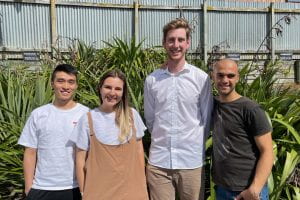 Cropsy Technologies – Using AI to help growers make data-driven decisions
Cropsy Technologies – Using AI to help growers make data-driven decisions
Cropsy Technologies is developing a combination of patent-pending hardware and AI to help growers make data-driven decisions. Cropsy estimates that the average winegrower currently monitors less than 1% of their vines, and they see a competitive advantage possible if horticultural problems are identified early.
Co-founder Leila Deljkovic explains “We give grape growers the power to know every single plant so they can make the best decisions for their crop. We do this by attaching our proprietary vision system to tractors, which will scan the crop while the tractor operators are doing their daily jobs, and AI tells us if there’s something wrong. The amount and detail of information we’re uncovering on growers’ vineyards was just impossible to do until now, and it’s unlocking a whole world of opportunities to manage crops in a completely new way. It’s something which we’re confident could transform the entire industry.” Read more
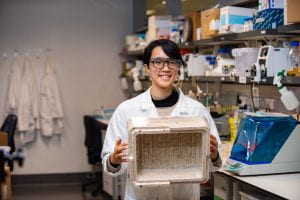 BioFab – Fungal packaging growing into direct replacement for expanded polystyrene
BioFab – Fungal packaging growing into direct replacement for expanded polystyrene
BioFab, a biotechnology company founded by a team including University of Auckland alumni, are making a sustainable alternative to expanded polystyrene. They are using New Zealand fungi to grow a compostable and functional fungal mycelium packaging material they call mushroom packaging. This breakthrough technology for the construction and packaging industries is just their first step on a mission to encourage a world where waste streams regenerate, rather than destroy, our natural environment. Read more
Global Changemakers programme – Encouraging study abroad students’ to become global change makers 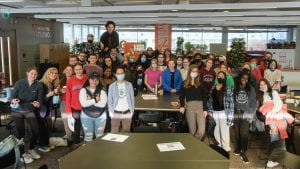
An innovative programme that merges sustainability education with an introduction to social entrepreneurship has been piloted with the latest influx of University of Auckland Study Abroad students.
In the first day of the programme participants learned about the scale of the climate challenge, the carbon footprint of studying abroad and how to travel more sustainably. They also developed a personal climate action plan, assessing their carbon footprint using a carbon calculator, and shared ideas for climate action on campus. In the second day, participants explored climate leadership and innovation, including concepts of changemaking, social innovation and social entrepreneurship. Read more
GreenSpot Technologies – Turning food waste into high-nutrition flour
Greenspot Technologies, a start-up that came to life through the Centre for Innovation and Entrepreneurship’s Velocity programme, has created a range of flour made from fermented fruit and vegetable pulp. Greenspot Technologies’ range includes pinot noir, sauvignon blanc, apple, beetroot, orange, carrot and parsnip flours. Their flours are high in protein and fibre and low in sugar and fat. They are made using a sophisticated fermentation process first developed in the research labs of the University of Auckland. Since going through the Velocity programme, Greenspot Technologies has received substantial investment and has made the move to France and have won multiple international awards for innovation.
Could this zero waste, gluten-free, vegan, low-carb NZ pinot noir flour be the next superfood?
Ninna’s story
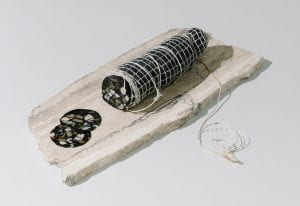 NewFish – New Zealand future food company developing new nutrient sources
NewFish – New Zealand future food company developing new nutrient sources
New Zealand venture NewFish® is pushing the boundaries of research and food culture to develop products that aim to introduce consumers to alternative food sources. University of Auckland alumna Paula Jeune has joined their operations team as a Research and Development Commercialisation Assistant, helping to translate the Creative Director’s recipes into commercially scalable products.
Jeune says that hybrid proteins such as those produced by NewFish have the potential to acclimatise consumers to alternative proteins. “The more we can introduce people to different protein sources, the more we can reduce the neophobia around these foods and reduce our reliance on animals.” Read more
 Kami – Transforming classrooms into a paperless world
Kami – Transforming classrooms into a paperless world
According to Recycle Now, the average UK primary school produces 45kg of waste per pupil each academic year. The global production of paper and cardboard stood at 419.72 million metric tons in 2018, with almost one-third attributable to graphic paper. Kami is transforming classrooms into a paperless world. Kami’s cloud-based software application allows teachers and students to annotate, view, edit and collaborate on digital documents in their browser and complements existing office suites, cloud platforms and learning management systems.
The idea came from humble beginnings as a way for co-founders Alliv Samson, Jordan Thoms and Hengjie Wang to be able to collaborate on their own university study notes. After taking their venture idea through the Centre for Innovation and Entrepreneurship’s Velocity programme the business has grown exponentially, particularly in the last year since the start of the spread of Covid-19. In 2021, Kami hit 27 million users worldwide in 180 countries, enabling children to access an education even in the middle of a global pandemic. Read more
Learn about their beginnings at the Business School’s Centre for Innovation and Entrepreneurship
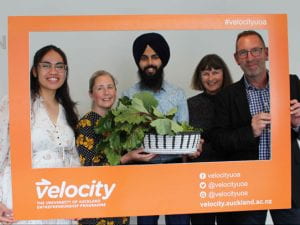 Maara Fresh – Feeding hearts, minds and stomachs
Maara Fresh – Feeding hearts, minds and stomachs
An innovative business idea developed by Manurewa’s home-grown entrepreneurs will benefit more than 2,000 Manurewa High School students through Ka Ora, Ka Ako, the Government’s healthy school lunches programme, starting in 2021. Maara Fresh is a social enterprise that literally grew out of the Manurewa Community Garden.
Developed with the support of the University of Auckland Business School’s Centre for Innovation and Entrepreneurship (CIE) it provides a structure to ensure the financial sustainability of initiatives run out of the gardens. These include growing fresh produce to supply to local families, community kitchens and food banks in Manurewa and an education programme about horticulture for students to ensure sustainability. Read more
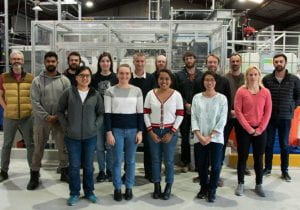 Mint Innovation – Using microbes to turn e-waste into precious metals
Mint Innovation – Using microbes to turn e-waste into precious metals
Mint Innovation is an urban mining company that has developed a novel biotechnological solution allowing them to use inexpensive chemicals and naturally sourced microbes to extract and recover precious metals such as gold, palladium, and copper from common forms of waste produced by modern society. Their initial focus has been on recovering these valuable metals from electronic waste, a growing problem worldwide with 54 million tons of e-waste generated each year.
Leading their research and development is University of Auckland alumnus Robert Staniland, who completed his Postgraduate Certificate of Commercialisation and Entrepreneurship through the Business School’s Centre for Innovation and Entrepreneurship in 2019. Read more
 Nilo – Turning global plastic problem into exponentially useful resource
Nilo – Turning global plastic problem into exponentially useful resource
Tech company Nilo is on a mission is to see ‘the end of waste’ by providing a way for all plastic to be processed and repurposed on a global scale. They are developing technology that can turn all types of plastic waste, including currently unrecyclable ocean and landfill plastic, into industrial adhesives that have a number of applications including the manufacturing of wood boards, plywood, MDF, and laminated products. The patented process is clean and low energy, with the potential to combine with other waste streams such as construction and demolition waste, wood, textiles, and e-waste.
They are also working to produce high-strength roading solutions that improve not only the environmental but economic and safety aspects of the roading and pavement industry. At the end of their use, all of Nilo’s products can be granulated and re-processed into new products, creating a circular economy where plastic waste is the most valuable resource. Read more
 StrutFit – Reducing waste generated through returns
StrutFit – Reducing waste generated through returns
More people than ever are buying clothes and shoes online, and for good reason: it’s quicker, cheaper, and there’s more to choose from. Each year, 5 billion pounds of waste is generated through returns. Born out of the Centre for Innovation and Entrepreneurship’s Velocity programme, StrutFit allows shoppers to virtually ‘try-on’ shoes by analysing a photo of your foot which you can take using your smartphone camera. The tech then uses deep learning (a subset of machine learning that’s often used for image recognition) to measure the length of your foot and tell you what size you should buy. The venture has already been implemented by brand Bobux and is set to be adopted by many more companies which could have a massive impact on reducing landfill waste.
StrutFit are taking the guesswork out of buying shoes online
Entrepreneur and Artist merges worlds with new exhibition
 GreenSpot Technologies’ Ninna Granucci receives acclaim from the European Commission
GreenSpot Technologies’ Ninna Granucci receives acclaim from the European Commission
Dr Ninna Granucci is a scientist and CEO of Green Spot Technologies, which ferments and upcycles natural food byproducts from food processing industries to produce highly-nutritious ingredients. It’s a circular economy venture, which aims to help reduce the amount of plant-based product that is annually wasted, currently estimated at 32% by the UN’s Food and Agricultural Organisation. Green Spot’s responsible technology makes use of product such as brewery spent grains, winery grapes marc and beverage apple pomace while generating only clean water as waste. The resulting flours are high fibre (including prebiotics), high protein, rich in minerals and clean label. Read more
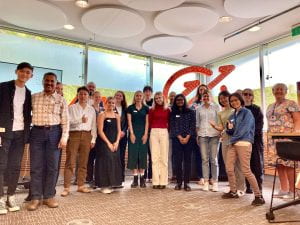 UoA students and staff taking on the world, one SGD at a time, as Future 17 trailblazers
UoA students and staff taking on the world, one SGD at a time, as Future 17 trailblazers
Twenty students and five staff will be the University of Auckland Future17 trailblazers, taking part for the first time in a global education programme that focuses on sustainability challenges and bridges the worlds of higher education and work.
With an emphasis on developing 21st century skills, students and mentors from universities across Europe, Africa, South America and Oceania team up with international partner organisations to collaborate on real-world challenges related to the 17 United Nations Sustainable Development Goals (SDGs). This culminates in a showcase event where student teams present their proposed solutions to the partners — which range from corporate organisations to charities and NGOs. Read more
 Valka Yoga: Aligning entrepreneurship, innovation and chakras
Valka Yoga: Aligning entrepreneurship, innovation and chakras
Danny Garg’s mind has always raced to solve problems ever since he was a child. It was this creative energy that helped fuel Danny to build his thriving business, Valka Yoga, selling sustainable, functional yoga mats and accessories. With over 20,000 yoga mats sold so far, Danny is committed to his company’s goal of producing ‘the most eco-friendly yoga mat in the world’. Valka Yoga proudly proclaims the title of ‘New Zealand’s leading supplier of ethically and sustainably sourced yoga mats and accessories’ and is making gains in the Australian market. Now, Danny has his sights set on the United States of America. Read more
EMAIL
CIE@AUCKLAND.AC.NZ
POSTAL ADDRESS
THE UNIVERSITY OF AUCKLAND BUSINESS SCHOOL
PRIVATE BAG 92019, AUCKLAND













